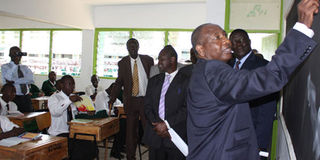There’s more to exam results than staffing

Teachers Service Commission secretary Gabriel Lengoiboni teaching a form four class in this file photo. Learning in schools in north eastern Kenya has been paralysed as teachers who are not from the region continue to stay away. FILE PHOTO |
What you need to know:
- Sadly, some reactions have been irrational, in some cases resulting in physical violence against teachers. Last week, another dimension to the blame game was added by Garissa South MP, Mr Abdullahi Diriye, when he attributed the poor performance in the north eastern region to teacher shortage.
- In fact, in the last four years alone, the commission has recruited 762 teachers for secondary schools in Garissa, Mandera and Wajir and more than 1500 for primary schools.
Since the release of the Kenya Certificate of Primary Education (KCPE) exam results two weeks ago, there have been several reactions and all sorts of explanations as to why some counties and regions performed dismally.
The 2013 results were significant in two respects; it was the first examination in a devolved system where county governments see the results as a measure of the county’s development potential.
Secondly, at more than 800,000 pupils, the examination had the highest number of candidates in Kenya’s history.
Sadly, some reactions have been irrational, in some cases resulting in physical violence against teachers. Last week, another dimension to the blame game was added by Garissa South MP, Mr Abdullahi Diriye, when he attributed the poor performance in the north eastern region to teacher shortage.
Strangely, the MP went ahead to attack TSC Secretary Gabriel Lengoiboni over the poor results, claiming it was caused by understaffing. (READ: You have failed us, MP tells Lengoiboni)
A week earlier, teachers in Garissa dared their governor to sack them after he threatened to do so over their dismal performance.
To be sure, at a mean score of 180 out of a possible 500, performance in the north eastern counties was the worst in the country. One myth, however, that needs to be retired is that availability of teachers is in itself the only sure way towards excelling in national examinations. If that was the case, then the northern counties would not be registering such poor results.
In terms of staff availability, the northern region is one of the relatively well-staffed areas in the country.
The current staffing model for schools is demand-driven and requires that vacancies be advertised in specific schools. This is meant to address perennial staffing problems in the regions.
In both cases, teachers commit themselves in writing to work in stations they are initially posted to for a minimum of five years. This has created stability in the staffing of schools in areas that used to experience a very high turnover of teachers such as Garissa, Mandera, Wajir and some parts of coast, Rift Valley and eastern regions.
As a result of this policy, the commission has progressively improved the staffing situation of schools in the region to the extent that all schools have more than 70 per cent of the required teaching force while most high-potential regions have only slightly more than half.
In fact, in the last four years alone, the commission has recruited 762 teachers for secondary schools in Garissa, Mandera and Wajir and more than 1500 for primary schools.
In spite of all these efforts, performance remains dismal. General insecurity is mainly to blame. On several occasions, teaching has been suspended following banditry attacks and inter-clan conflicts.
The real stumbling block to performance in the north eastern region is indiscipline among learners. Students routinely abuse, threaten and even assault teachers, especially those from outside the region, who comprise more than 90 per cent of teachers working in the region.
Clearly, it is incumbent upon leaders and all the other stakeholders in education to promote a safe working environment for teachers. Only then will the region reap the fruits of improved staffing levels and subsidies in education.
Mr Kamotho is Head of Communications, Teachers Service Commission (TSC).




